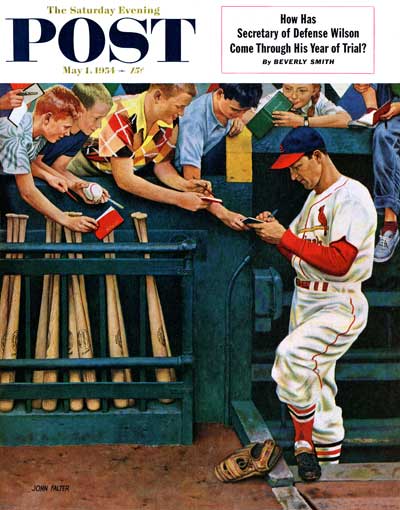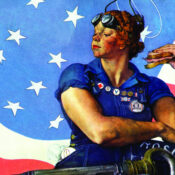A Typing Controversy
Like a lot of people of a certain age, I took a typing class in high school. I hated it and didn’t do well, which always makes me chuckle because now I actually type for a living, every single day. I think what I disliked at the time was having to sit a certain way, holding my hands in a certain position, endlessly recording the events of all good men who come to their country’s aid. Like a kid who just wants to play the guitar instead of learning chords or how to read music, I just wanted to type. Also, my teacher looked a lot like Larry Fine of the Three Stooges, and that distracted me.
One thing I remember from typing is you needed to put two spaces after a period. But that’s not really true online, and that has a lot of people who still like to put in two spaces a little, well, irritated. In this piece at Mel, amusingly titled “For the Love of God, Stop Putting Two Spaces after a Period,” John McDermott explains in detail why you should now only put one space after a period. In this follow-up piece, McDermott explains how a lot of people didn’t like to be told to put only one space after a period and let him know it in often colorful, vulgar terms (and often using only one space after a period).
I’ve never really thought about how many spaces come after periods in print books and magazines and newspapers. It does really stick out when I get an e-mail where someone uses two spaces. Now I’m going to really notice it, and it’s probably going to drive me batty.
Boomers vs. GenXers vs. Millennials

Every generation complains about the generation that preceded them. Millennials blame Generation X for everything, Generation X blames Boomers for everything, and Boomers blame The Silent Generation, who then blame The Greatest Generation. At least I think that’s how it goes. It’s hard to keep track of who is named what when and why.
I have a slightly different take. I’m a GenXer, and I’ve never blamed Boomers for anything. It never occurred to me to blame Boomers. Instead, like any normal GenXer or Boomer, I complain about Millennials.
BuzzFeed has the results of a poll conducted by the Ipsos firm that found out what older people and younger people think they should do to be considered an adult. The topics range from living at home and doing your own laundry to paying your own bills and having an annual medical checkup.
Shouldn’t all of these numbers be near or at 100 percent? Not every category for every age group, of course, but some of these numbers seem low to me. Only 39 percent of people aged 35–54 consider cooking for themselves more than twice a week to be a sign you’re an adult? Only 43 percent of those aged 18–34 think getting no financial support from their parents is a sign you’re an adult? Only 16 percent of everyone polled gets a flu shot? I’d love to see a similar poll taken in 1980 or 1960.
Some of the results shock me, but not as much as finding out that the word adult is now used as a verb.
And the Tony Nominees Are …
I could go into detail about this year’s Tony nominations. About how this person or this show got a lot of nominations or how this person was snubbed or what the nominations mean. But I haven’t seen any of the shows, don’t really know much about the shows, and I’ve never been to a Broadway show. But here’s the list of this year’s nominees. You probably know more than I do.
The awards show will air June 17 on CBS.
Strike Averted!
Three weeks ago, I told you about a possible writers strike that was about to hit Hollywood. But now we don’t have to worry about it because the two sides came to an agreement at the last minute on Tuesday. It’s a three-year deal that gives writers more money (including increases in residuals), expanded contract protection, and changes to healthcare.
Now, if you were actually hoping for a Hollywood strike, you might be in luck: An actors strike could be next.
Frozen in Time
Whenever I watch House Hunters I get a little irritated, for two reasons. One, I don’t really believe that the show is completely honest. The setups seem staged, and everything is a little too scripted (and a 2012 investigation seems to back up that theory). Second, I hate when the couples are shown an older home, maybe a midcentury home with its original rooms and design and appliances, and the first thing that comes out of their mouths is “we have to tear this out!” I hate that. Those homes should be owned by people who want to keep most of the original features intact.
Like the people shown in this Wall Street Journal piece titled “Life Inside a Time Capsule.” It’s about people who buy older homes and decide to keep them the way they’ve always been, almost like living their lives the way the previous owners lived theirs decades ago. The slideshow is terrific, even if some of the designs of the ’70s homes may disorient you for a moment.
RIP Florence Finch, Norman T. Hatch, Colonel Bruce Hampton, Lorna Gray, Trustin Howard, Leo Thorsness, and Bruce Hall
Florence Fitch was a World War II hero whose bravery wasn’t even known to the public until decades later. She actually died on December 8 at the age of 101, but her family didn’t make the announcement until this week.
Norman T. Hatch had a connection to World War II as well. He was a Marine cinematographer whose shocking footage of a battle in the Pacific won him an Academy Award in 1946. He died April 22 at the age of 96.
Colonel Bruce Hampton was considered the “Godfather of the Jamband Scene” and played with such people as Frank Zappa, Blues Traveler, Spin Doctors, and Widespread Panic, as well as many of his own bands. He collapsed on stage on Monday during a birthday celebration. He was 70.
Lorna Gray was an actress who appeared in several shorts of the aforementioned Three Stooges and in movies with people like John Wayne and Buster Keaton, as well as many other films during the ’30s, ’40s, and ’50s. She passed away Sunday at the age of 99.
Trustin Howard was the head writer of The Joey Bishop Show and often acted in movies under the name Slick Slavin. He died in April at the age of 93.
Leo Thorsness was an airman held captive along with John McCain in the prison known as “The Hanoi Hilton” during the Vietnam War. He died Tuesday at the age of 85.
Bruce Hall was a CBS newsman for 20 years and an NBC newsman for 17 years. He covered space for both networks, as well as thousands of other stories. He died Tuesday at the age of 76.
This Week in History
Citizen Kane Premieres (May 1, 1941)
The classic Orson Welles film had its world premiere at the RKO Palace Theatre in New York City. The movie is usually on “best movies of all time” lists, including this critics poll in The Saturday Evening Post in 1978.
Hindenburg Explodes (May 6, 1937)
Here’s how reporter Herbert Morrison described the event on the ground. By the way, this is how Morrison actually sounded. The video we usually see has an audio recording that was running too fast, and Morrison’s voice has always sounded higher than it was.
This Week in Saturday Evening Post History: Stan the Man Cover (May 1, 1954)

John Falter
May 1, 1954
The man called Stan was Stan Musial, outfielder and first baseman for the St. Louis Cardinals, and in this cover from John Falter, he’s shown signing autographs for fans. Here’s the profile from that issue of the Post, titled “The Mystery of Stan Musial.”
May Is National Hamburger Month
Who invented the hamburger? It’s an odd thing to think about since it seems to have been with us forever. Taking a look at the Wikipedia page for hamburgers (yes, there’s a Wikipedia page for hamburgers), a version of its origin story goes all the way back to 1758, but it’s not really the modern one we enjoy. Some people say the first hamburger was served at Louis’ Lunch in New Haven, Connecticut, in 1900. Others say it was Charlie Nagreen in 1885 (a meatball sandwich), while White Castle says it was the invention of Otto Kuase in 1881. And that’s only three of the many possible inventors. There’s a dispute because it all comes down to not only when it was invented but also what the exact definition of hamburger is.
Someone should make a movie about it.
Here are three burgers to make this month: a Spiced Buffalo Burger from Emeril Lagasse, a Turkey-Meatloaf Burger from Martha Stewart, and a Cheese-Stuffed Burger from country star Trisha Yearwood.
By the way, if you do get a hamburger this month and have to borrow the money to do so, make sure you pay it back by Tuesday. Like Wimpy.
Next Week’s Holidays and Events
V-E Day (May 8)
Also known as “Victory in Europe” Day, it’s the day in 1942 when we celebrated the formal surrender of Germany, which ended World War II in Europe.
National Teachers Day (May 9)
In April, the 2017 Teacher of the Year was honored at the White House. Her name is Sydney Chaffee, and she teaches at the Codman Academy in Boston.
Become a Saturday Evening Post member and enjoy unlimited access. Subscribe now




Comments
Bob, you’re right about the Tony Awards. I don’t know either, and don’t care to.
Kris is exactly right. Also, the two spaces indicate that the sentence has reached its end. This isn’t much to ask.
It drives me nuts when people do not put two spaces after a period, exclamation point, or question mark (one space after a semicolon is fine). I was a medical copyeditor for 20-some years, so I’m rather anal about this. I don’t care if you are writing something on line or is hard copy, two spaces are used because it is much easier to read/much easier on the eyes to have two spaces after those punctuations rather than just one space. To me it makes the author appear illiterate or at least not knowledgeable.